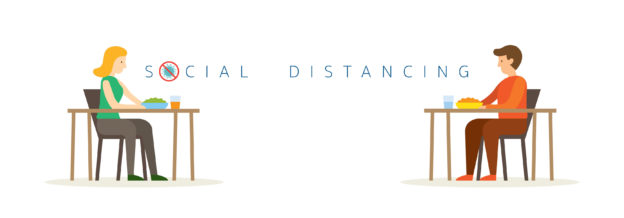Social distancing is going to change the way our organisations are structured and by default the career and job search landscape. In 2016, I identified an emerging trend which I call a “cluster career.” This is a series of diversified revenue generating professional activities, operating sequentially or simultaneously. This not be confused with a career cluster which is quite different. Seeking out career opportunities compatible with social distancing in a post Corona virus workplace is going to require a significant mind shift for all involved: job seekers and hiring managers and recruiters.
Impacted sectors
Social distancing regulations will impact the roles of anyone in people facing jobs or roles involving large groups, which will change dramatically in the short-term. Hospitality, travel, leisure, and events are all sectors which will be hit by the effects of the lockdown and steps to mitigate risk associated with the virus. So how are people going to cope to as they look for new revenue generating activities?
Over the years we have all been moving away from the idea of a linear career and the concept of a portfolio career has also been around for a while. The expansion of the “gig”, on demand or collaborative economy is a key part of that shift. It is estimated that an even higher percentage of workers in the post corona workplace will be on demand, as organisations move to get businesses back on track.
Cluster Career
In 2016 I took a look at the Cluster Career concept which takes diversification one step further than a portfolio career, which taps into transferable skills. A cluster career involves multiple activities in seemingly unrelated fields. Back then I saw two options:
- One activity at a time, in rotation. I wrote about Pete (The Feet) a marine engineer, who is also a chiropodist.
- Multiple activities simultaneously to suit demand. I mentioned the events manager, who was also a photographer and a graphic designer.
Today career management is going to have an added nuance around targeting roles which don’t involve direct personal contact. Much of this will now depend on social distancing recommendations for our workplaces which have yet to be decided.
What we will need over the next years is fast and continuous learning skills, an ability to change direction more than once probably, open-mindedness and mental agility. It will also be helpful to anticipate future trends. If only…
Strategic diversification
For this type of career management to be effective and to identify career opportunities compatible with social distancing, we have to apply some key concepts. In 2016 I asked two main questions: how will my basic knowledge add value – if at all? Then, will anyone want to pay for what I know or do?
Now we have to add an additional new and critical question: will I be allowed to do what I want to do? Followed by what do I need to adjust so that I can?
We don’t know how life will change over the next years, and for how long we will need to maintain reduced contact. Selecting career opportunities compatible with social distancing will become a vital component in our career planning. In my own case, face-to-face training sessions in large workshops will be a thing of the past. Break out sessions in small groups are for the history books. Throwing a ball to encourage engagement… nah.
Impacted sectors
This will impact us all in many ways, some of which we haven’t even thought of yet. It will hit major industry sectors where people are close together. Will our workspaces become more spread out to respect the two metre rule? Will we have to wear masks in the office? Maybe more people will work from home – but what if you don’t have the right accommodation?
Career planning today
Previously we talked about pursuing a passion and finding the ideal career, as if it were one single objective. Now we are more likely going to pursue professional activities which we will be allowed to practise under new regulations. We will also need to factor in jobs that will have value in the COVID19 era (medical devices, e-commerce, PPE manufacture, cleaning and hygiene products, food production, pharma, supply chain, mental health professions, care functions) These activities may, or may not, involve any transferable skills we have. I talked to one contact who is feeling the impact on her photography business and is now learning to code.
That will make career planning today more challenging. Having an open mind and being a life-long learner will be critical. People are going to consider options that they rejected before and will now compete in a tight market. They might want to learn new skills for learnings sake or simply to pay their bills. They may be forced into jobs they may not have chosen to put food on the table. This is going to make positioning and pitching even more important as candidates need to be convincing.
Recruitment changes
It will also mean we will need a new breed of recruiters and hiring managers, who should be trained to assess diverse skills, across multiple disciplines and respect different career choices. The days of penalizing people for “job-hopping,” periods of unemployment, taking sabbaticals and other career gaps, working part-time or on contract should be dead.
The need to be self-aware, self-advocating, self-reliant, self-sufficient, self- managing and self- promoting, maybe even self-taught and adaptable is going to increase.
The days when anyone but you took care of your career are over.
For all career coaching needs get in touch NOW





